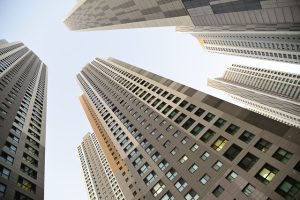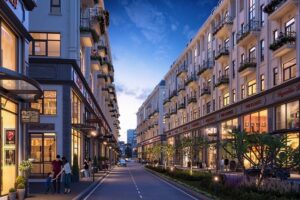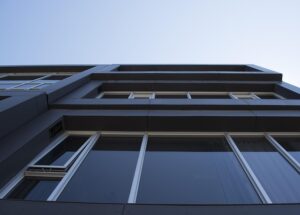HDB Executive Condo Market Trends and Price Analysis in Singapore
2023 has seen a resurgence in interest for Housing & Development Board (HDB) Executive Condos (ECs) in Singapore, with both new and resale units attracting buyers due to their affordability and modern amenities. New ECs are designed to meet contemporary li…….

2023 has seen a resurgence in interest for Housing & Development Board (HDB) Executive Condos (ECs) in Singapore, with both new and resale units attracting buyers due to their affordability and modern amenities. New ECs are designed to meet contemporary living standards and are often launched in mature estates or near upcoming MRT stations. Resale ECs offer immediate occupancy and potential value-buys for those who prefer to customize their homes. The performance and future price movements of HDB ECs are influenced by a variety of factors including macroeconomic indicators, demographic trends, government policies on supply, land availability, and interest rate changes. For investors considering HDB ECs as part of their investment portfolio, staying informed about these dynamics is crucial to making sound investment decisions that align with long-term capital appreciation goals in Singapore's property market.
Exploring the dynamic landscape of HDB Executive Condominium (EC) price trends in Singapore, this article delves into the multifaceted factors shaping their market value. From historical pricing patterns to the latest government policies, we analyze the influence on affordability and investment prospects. With a focus on recent price movements across different regions, we provide valuable insights for both homeowners and investors considering HDB ECs in Singapore’s vibrant property market. Join us as we navigate through these trends and their implications for your real estate ventures.
- Understanding HDB Executive Condominiums (EC) in Singapore
- Historical Price Trends of ECs in Singapore Since Their Inception
- Factors Influencing Price Movements of HDB ECs in Recent Years
- Analysis of EC Prices Across Different Regions in Singapore
- The Role of Government Policies on HDB EC Pricing and Affordability
- Market Trends: New vs. Resale EC Units in Singapore
- Predicting Future Price Movements for HDB Executive Condominiums
- Strategic Considerations for Investors Looking at HDB ECs in Singapore
Understanding HDB Executive Condominiums (EC) in Singapore

In Singapore, the public housing landscape is diverse and well-structured, catering to various income groups. Among these offerings, HDB Executive Condominiums (ECs) occupy a unique position, bridging the gap between public housing and private condominiums. These ECs are designed for middle-income families, offering them the benefits of both types of accommodation—the privacy and facilities of a condo with the affordability and stability associated with HDB flats. Prospective residents must meet certain criteria to qualify for an EC, such as income ceilings and being first-time flat owners. Over the years, the popularity of ECs has surged due to their attractive features, including larger unit sizes, a wide array of amenities, and prime locations. The pricing trends of HDB Executive Condos in Singapore reflect the dynamic interplay between market demand, economic conditions, and government policies aimed at ensuring housing affordability for the middle-income segment of the population. As such, tracking the price movements of ECs is essential for potential buyers and investors alike, as well as for policymakers who need to gauge the effectiveness of housing measures.
Historical Price Trends of ECs in Singapore Since Their Inception

The historical price trends of HDB Executive Condos (ECs) in Singapore have exhibited a dynamic trajectory since their inception in 1995. Initially, ECs were introduced as a hybrid housing option for eligible couples, offering a stepping stone from public to private housing. Over the years, the prices of these units have reflected both the stability of the HDB market and the influence of broader economic trends. In the early years, ECs were relatively affordable, providing a valuable opportunity for middle-income families to invest in property with the potential for capital appreciation.
As Singapore’s real estate landscape evolved, so did the prices of ECs. Factors such as location, the supply of units, and overall economic health have played significant roles in shaping these trends. The prices have generally trended upwards, reflecting the country’s robust property market. Notably, ECs situated in mature estates or those with good connectivity to public transport have seen a surge in demand and corresponding price increases. This demand is further driven by the appeal of private property benefits within the framework of the HDB scheme, such as the ability to sublet or sell back to the HDB board within certain stipulated periods. As such, tracking the historical price trends of HDB Executive Condos provides valuable insights into Singapore’s housing market and its responsiveness to policy changes, economic shifts, and demographic changes over time.
Factors Influencing Price Movements of HDB ECs in Recent Years

In recent years, the price movements of HDB Executive Condos (ECs) in Singapore have been influenced by a myriad of interrelated factors. The supply and demand dynamics within the housing market play a pivotal role; with limited availability of ECs as they are released through sales of balance flats or new launches, competition among prospective buyers can drive prices up. Government policies, such as the introduction of stricter loan-to-value ratios and increased cooling measures, have also impacted the purchasing decisions of potential homeowners, which in turn affects pricing trends. Additionally, economic indicators like interest rates, inflation, and the overall economic health of Singapore contribute to the affordability and desirability of ECs, thus influencing price movements. The socio-economic profile of residents opting for HDB ECs also shapes demand; as younger couples and families often prefer these condos due to their affordability and proximity to amenities, their housing preferences can lead to shifts in pricing. Furthermore, the location and availability of facilities, the maturity of the estate, and the development plans for the area are additional factors that investors and homebuyers consider when evaluating ECs, all of which can influence the pricing trajectory of these properties.
Analysis of EC Prices Across Different Regions in Singapore

In recent times, the prices of HDB Executive Condominiums (ECs) in Singapore have been a subject of keen interest among potential homeowners and investors alike. A comprehensive analysis of EC prices across different regions in Singapore reveals that these prices are influenced by a variety of factors, including geographical location, property market trends, and the unique features each EC offers. For instance, ECs situated within mature estates, such as Sengkang and Woodlands, have shown a steady increase in their pricing due to their convenience and the availability of amenities. These areas often attract buyers who are drawn to the blend of suburban tranquility with urban connectivity. In contrast, newer developments in regions like Tampines and Punggol command different price points, reflecting the varying demand dynamics and infrastructure development in these areas. The balance between affordability for younger first-time homeowners and investment potential for seasoned buyers is a delicate one, and the prices of HDB ECs across Singapore reflect this equilibrium. Prospective buyers should consider factors such as proximity to public transportation, accessibility to employment hubs, and the presence of educational institutions when evaluating EC prices, as these elements can significantly impact both current and future property values. Keeping abreast of the latest trends and data in the EC market is crucial for anyone looking to make an informed decision regarding HDB Executive Condominium purchases in Singapore’s dynamic real estate landscape.
The Role of Government Policies on HDB EC Pricing and Affordability

In Singapore, the pricing and affordability of HDB Executive Condos (ECs) are significantly influenced by the government’s housing policies. The Housing & Development Board (HDB), which is the public housing authority in Singapore, implements various measures to ensure that ECs remain accessible to eligible couples, particularly first-timers seeking a higher level of living relative to traditional public housing but without the premium prices associated with private properties. These measures include setting resale price ceilings for ECs and adjusting the income ceiling eligibility for applicants. Additionally, the government’s macroeconomic policies play a pivotal role in shaping the property market, including the pricing of ECs. Monetary and fiscal policies, such as loan-to-value ratios, mortgage service ratios, and interest rate adjustments, are tools used to modulate demand and stabilize prices within the housing sector. These policies are designed to maintain a balance between affordability and market sustainability, ensuring that HDB ECs continue to serve as an affordable housing option for the middle-income population in Singapore. The government’s proactive approach to policy-making in the real estate sector underscores its commitment to providing sustainable and affordable housing options for citizens at different stages of their lives.
Market Trends: New vs. Resale EC Units in Singapore

In recent years, the market for HDB Executive Condominiums (ECs) in Singapore has seen a notable trend favoring both new and resale units, each with its unique appeal to potential homeowners. New ECs, often part of the government’s efforts to diversify housing options, are designed to meet contemporary living standards while offering the benefits of freshly constructed homes. These properties come with a fresh coat of paint, modern amenities, and the latest smart-home features, catering to those seeking comfort and convenience in their living spaces. The new EC launches in mature estates like Sengkang, Tampines, and Punggol have been particularly popular, reflecting a growing preference for homes close to established amenities and transportation networks.
On the other hand, resale ECs present an alternative avenue for those looking to purchase a home with immediate occupancy without the wait associated with new developments. Resale units offer the advantage of price discovery, as they are transacted in the open market. This can often result in competitive pricing, making them attractive to buyers who are sensitive to value and willing to invest in renovations to tailor their living space to their preferences. The resale market for HDB ECs also allows for a better understanding of the neighborhood’s dynamics and community vibe before making a commitment, which is a significant factor for many homebuyers. Both new and resale HDB Executive Condos continue to be sought after for their spacious layouts, eligibility criteria that encourage stability and long-term residency, and the potential for capital appreciation over time.
Predicting Future Price Movements for HDB Executive Condominiums

In recent times, the property market in Singapore has shown a keen interest in the trajectory of prices for HDB Executive Condominiums (ECs). Analysts and investors alike scrutinize various factors that could influence future price movements of these housing units. The ECs, which are a hybrid of public and private housing, cater to the middle-income group and have become a popular choice for homebuyers due to their affordability and benefits similar to those of private condominiums. Predicting price trends in this segment involves a multifaceted approach that considers macroeconomic indicators, population growth patterns, government policies, and the availability of land for development. For instance, the supply of new ECs is tightly regulated by the Housing & Development Board (HDB), with release sites often determined by strategic planning. This regulatory framework, coupled with interest rate fluctuations and the overall economic climate, can significantly impact purchasing power and demand. Additionally, demographic shifts, such as an increasing population or changing household preferences, also play a crucial role in shaping price trends for HDB ECs. Market participants keep a close eye on these dynamics, as they can be early indicators of future price movements. Investors should therefore stay informed about the latest developments in the broader economic context and the specific policies affecting the real estate market to make well-informed decisions regarding HDB Executive Condominium investments.
Strategic Considerations for Investors Looking at HDB ECs in Singapore

When considering an investment in HDB Executive Condominiums (ECs) within Singapore, prospective investors must weigh several strategic factors. The unique nature of ECs as hybrid homes designed for upgrading families means they offer a different proposition compared to both public and private housing. These properties start off with a lower entry price point relative to other Housing & Development Board (HDB) flats but can appreciate in value over time, potentially offering capital gains. Investors should pay close attention to the location of the EC, as those situated in mature estates or near future MRT stations tend to see higher demand due to their convenience and connectivity. Additionally, market trends and government policies regarding EC eligibility and supply play a crucial role in price movements. It is imperative for investors to stay abreast of these dynamics, as they can significantly influence the investment potential of HDB ECs.
Another key consideration for investors is the timing of their purchase. The EC market is sensitive to economic conditions, interest rates, and the overall property market sentiment. A thorough understanding of the economic indicators that drive the property market, such as unemployment rates and consumer confidence, can provide valuable insights into when might be the most opportune time to invest. Moreover, monitoring the number of new EC launches and the pace of sales can offer clues on market sentiment and future price trends. By analyzing these factors, investors can make more informed decisions that align with their long-term investment objectives for HDB Executive Condominiums in Singapore.
In conclusion, the trajectory of HDB Executive Condo (EC) prices in Singapore reflects a dynamic interplay between market forces, demographic shifts, and government policy adjustments. Historical data indicates a steady rise since their introduction, with significant influence from economic conditions and housing supply. Investors and homebuyers interested in ECs must consider current trends and future projections when making decisions. The strategic location, design, and facilities of new versus resale units can significantly impact investment potential. As the government continues to shape the housing landscape through various measures, staying abreast of these policies is crucial for anyone looking to invest or purchase an HDB EC. Prospective investors are advised to monitor market trends closely, as they are key to predicting and capitalizing on future price movements within this unique segment of Singapore’s property market.







